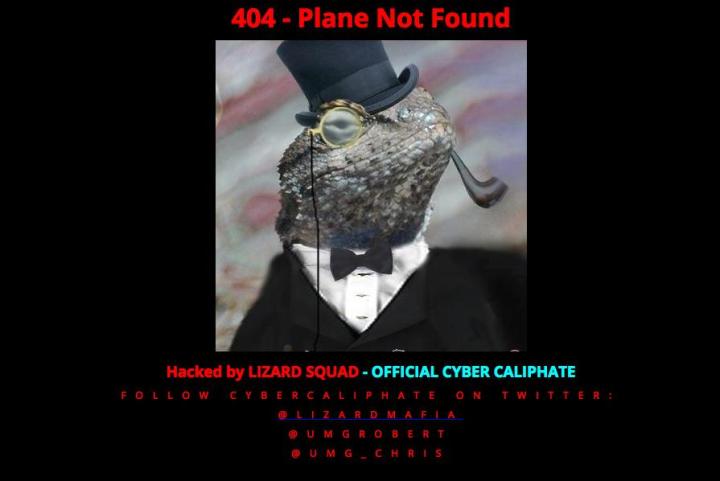
The carrier, which is still reeling from last year’s loss of two passenger planes, has now had its official website hacked apparently by Lizard Squad, a group known for a string of recent denial-of-service attacks on high-profile services.
‘404 – Plane Not Found’
The airline’s homepage was hit early Monday ET and at the time of writing continues to show Lizard Squad’s trademark image of a tuxedo-wearing lizard. Above it is the message, “404 – Plane Not Found,” presumably in reference to the airline’s lost MH370 plane which disappeared from radar screens last March as it flew from the Malaysian capital of Kuala Lumpur to Beijing with 239 people on board.
Under the image it reads, “Hacked by LIZARD SQUAD – OFFICIAL CYBER CALIPHATE.” A number of news outlets, the Wall Street Journal among them, reported that some versions of the hacked homepage carried the message, “ISIS will prevail.”
The defaced webpage also includes an auto-playing rap song about the group’s hacking exploits.
Malaysia Airlines: ‘User data remains secured’
Malaysia Airlines has issued a statement confirming it’s aware of the attack, at the same time insisting that its servers have not been compromised and that user data “remains secured.”
“The airline has resolved the issue with its service provider and the system is expected to be fully recovered within 22 hours,” the carrier said on its Facebook page, meaning its official site may not be up and running again until Tuesday at the earliest.
Despite the airline’s assurances, a message posted on Lizard Squad’s Twitter account said it intends to “dump some loot found on malaysiaairlines.com servers soon,” and in another said that the carrier’s claim that its servers had not be infiltrated was untrue.
Lizard Squad last month took credit for hacks that compromised the Sony PlayStation Network and Microsoft’s Xbox Live service. An arrest was made earlier this month in connection with the attack, though no charges have yet been brought.
It’s not clear why Malaysia Airlines has been targeted by Lizard Squad, though as events continue to unfold, the hacking group’s motivation may become clearer.


